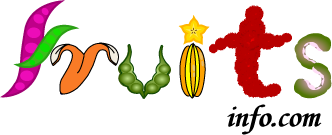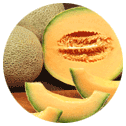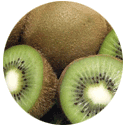Kiwi Health Benefits And Nutrition Values
Kiwi fruit are called as Chinese Gooseberry, but now it is known as the kiwi fruit. It was introduced into New Zealand in 1906 from China, where it originated, and has been commercially cultivated there ever since.It is the edible berry belongs to the group woody vine Actinidia deliciosa and genus Actinidia.The fruit has a soft texture and sweet in taste.Today the commercial crop in several countries, such as Italy, New Zealand, Chile, Greece and France are only the kiwi fruit.

Nutrient |
Amounts/Selected Serving |
DV% |
|---|---|---|
Calcium |
60.2mg |
6% |
Iron |
0.5mg |
3% |
Magnesium |
30.1mg |
8% |
Phosphorus |
60.2mg |
6% |
Potassium |
552mg
|
16% |
Sodium |
5.3mg |
0% |
Zinc |
0.2mg |
2% |
Copper |
0.2mg |
12% |
Manganese |
0.2mg |
9% |
Selenium |
0.4mcg |
1% |
Fluoride |
~ |
Nutrients |
Amounts/Selected Serving |
DV% |
|---|---|---|
TotalCalories |
108(452 kJ) |
5% |
Carbs |
93.5(391 kJ) |
|
Fat |
7.7(32.2 kJ) |
|
Protein |
6.8(28.5 kJ) |
|
Alcohol |
0.0(0.0 kJ) |
Nutrients |
Amounts/Selected Serving |
DV% |
|---|---|---|
Cholesterol |
0.0mg |
0% |
Phytosterols |
~
|
~ |
Nutrients |
Amounts/Selected Serving |
DV% |
|---|---|---|
Fat |
0.9g |
1% |
Saturated Fat |
0.1g |
0% |
Monounsaturated fat |
0.1g |
|
Polysaturated Fat |
0.5g |
|
| trans fatty acids |
~ |
|
transmonoenoicfattyacids |
~ |
|
trans-polyenoicfattyacids |
~ |
|
Omega-3 fatty acids |
74.3mg
| |
Omega-6 fatty acids |
435mg |
Nutrient |
Amounts/Selected Serving |
DV% |
|---|---|---|
Vitamin A |
154IU |
3% |
Vitamin B |
0.1mg |
6% |
Vitamin B |
0.0mcg |
0% |
Vitamin C |
164mg |
273% |
Vitamin D |
~ |
~ |
Vitamin D3 |
0.0mg |
|
Vitamin E |
2.6mg |
4% |
Vitamin K |
71.3mcg
|
13% |
Thiamin |
0.1mg |
89% |
Riboflavin |
0.0mg |
3% |
Niacin |
0.6mg |
3% |
Pantothenic |
0.3mg |
3% |
Choline |
13.8mg |
|
Betaine |
0.9mg |
|
Folate |
44.2mcg |
11% |
Nutrients |
Amounts/Selected Serving |
DV% |
|---|---|---|
carbohydrates |
25.9g
|
9% |
Dietary Fiber |
5.3g |
12% |
Starch |
0.0g |
|
Sugars |
15.9g |
Nutrients |
Amounts/Selected Serving |
DV% |
|---|---|---|
Protein |
2.0mg |
4% |
Nutrients |
Amounts/Selected Serving |
DV% |
|---|---|---|
Alcohol |
0g |
|
Water |
147g |
|
Ash |
1.1g |
|
Caffeine |
0.0mg |
|
Theobromine |
0.0mg |
- RESPIRATORY PROBLEM
- HEART & COLON HEALTH
- AGE-RELATED MUSCULAR DEGENERATION (ARMD)
Protective effects were found after a study on a sample of children aged 6-7 years who consumed kiwi fruit, reducing the risk of respiratory problems. They have reduced the number of episodes of wheezing by 44%, compared with other children. The benefits of kiwi fruit were very obvious in children with asthma and protective effects were observed in those who consumed even one fruit a week.
As the kiwi fruit is rich in fiber, it reduces waste cholesterol and the risk of cardiovascular disease, and also removes toxins from the colon and helps in preventing colon cancer. The foods high in fiber are recommended for people with diabetes, as these can maintain the normal glucose level.
Considers cherries among the very most healthful and nutritious foods you can eat. Aside from being a good source of vitamin A, Dr. Bowden explains that cherries contain two valuable cancer-fighting compounds, quercetin and ellagic acid. Quercetin is a powerful antioxidant that destroys free radicals and also exhibits anti-inflammatory capabilities that may help to prevent heart disease. According to Dr. Bowden, ellagic acid can inhibit the growth of cancer cells and may even directly kill existing cancer cells without affecting your healthy cells.
- AGE-RELATED MUSCULAR DEGENERATION (ARMD)
- CARDIOVASCULAR DISEASE
- CONSTIPATION
It is important to note that kiwi fruits contain a remarkable amount of Vitamin C, E and A. Vitamin C is a water-soluble antioxidant that has been proven to protect our body from free radicals, dramatically improving the health of individuals who consumed it regularly against all kinds of disease, from cardiovascular problems to cancer and obesity. Vitamin E has been proven to have similar effects, but is fat-soluble and thus is complimentary to Vitamin C in its functions. Kiwi fruits contain both these vitamins in high amount, which help protect our body against free radicals from all fronts.
This means heart health, including blood vessels. Taking an aspirin everyday has been recommended by doctors to help thin the blood. No need to damage other parts of your body by taking a drug every day. Kiwifruit is a natural blood thinner.In tests using 2-3 kiwifruit a day, it was shown to lower a person's triglyceride levels by 15%. Triglycerides are fats in your blood which we get from unhealthy animal fats and trans fats from processed foods. A build up of these fats are what can lead to heart attacks. The other positive thing from this was kiwifruit also reduced platelet aggregation by 18%. This is "stickiness" that forms in the blood which can lead to poor circulation, taxing the heart.
One of the reasons of constipation is fecal residue in food and water .Although Fruits are rich in dietary can not be digested and absorbed soon, but it can absorb and retain moisture, so that faces become soft; also stimulates the secretion of digestive juice and intestinal peristalsis, is conducive to the stool excretion, play a role in the prevention and treatment of constipation. More fruit with fiber in the treatment of constipation are kiwi, watermelon, bananas, grapefruit, and orange, and jujube, mulberry and so on. kiwi contains more dietary fiber and oligosaccharides, protein enzymes, rapid clearance of these substances in the body in addition to the harmful accumulation of metabolites, prevention, treatment of constipation, there are very good role in preventing colon cancer and atherosclerosis .
PERSON WHOM MAY NOT CONSUME KIWI
- ALLERGIES
The allergic reactions to kiwi fruit depend on fruit. Kiwi fruit skin can be digested, some people who experience no other problems from eating kiwi may get oral irritation from eating fruit with the skin on.















